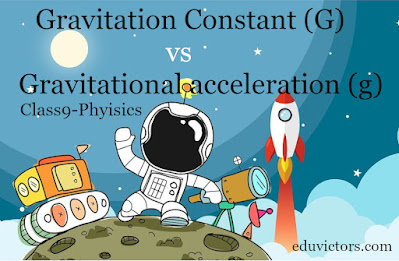Class 9 - Physics - What is the difference between Gravitation Constant (G) and Gravitational acceleration (g)
The gravitational constant (G) is a fundamental physical constant that appears in Newton's law of universal gravitation. It determines the strength of the gravitational force between two objects, and it is always the same, regardless of the distance between the objects or their masses. The value of G is approximately 6.674 x 10⁻¹¹ N(m/kg)².
Gravitational acceleration (g) is the acceleration that an object experiences due to the gravitational force exerted on it by another object. It is the acceleration that an object experiences when it is falling freely near the surface of a planet or other celestial body. The value of g varies depending on the mass of the object and the distance between the two objects, and it is usually measured in meters per second squared (m/s²). For example, the value of g on Earth's surface is approximately 9.8 m/s², which means that an object dropped near the surface of the Earth will accelerate at a rate of 9.8 m/s² due to the Earth's gravitational pull.
In summary, G is a constant that determines the strength of the gravitational force between two objects, while g is the acceleration that an object experiences due to that force.
| No. | Gravitation Constant (G) | Gravitational acceleration (g) |
|---|---|---|
| 1. | Its value is 6.674 x 10⁻¹¹ Nm²/kg² | Its value is 9.8 m/s² |
| 2. | Its value remains constant always and everywhere. | Its value varies at various places. |
| 3. | Its unit is Nm²/kg² | Its unit is m/s² |
| 4. | It is a scalar quantity | It is a vector quantity. |
👉See Also:
Ch 10 - Gravitation (Q & A, Study Notes, NCERT Solution)
Ch10 - Gravitation (MCQs)
Ch 10 - Gravitation (Understanding Mass and Weight)
Ch 10 - Gravitation - 51 Question You must Revise
Ch 10 - Gravitation (Worksheet-2)
Ch 10 - Gravitation and Flotation (Solved Problems)
Ch 10 - Gravitation (1 Mark Q & A)

No comments:
Post a Comment
We love to hear your thoughts about this post!
Note: only a member of this blog may post a comment.